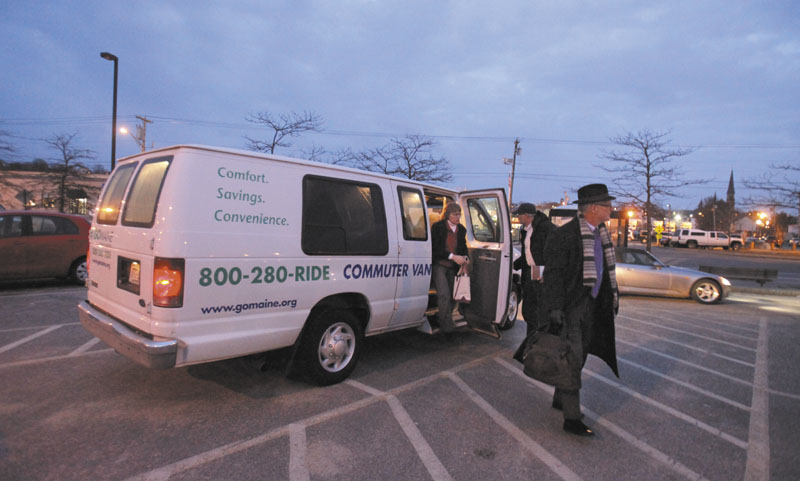AUGUSTA — Lawmakers want another look at financial data that the Maine Department of Transportation used to justify privatizing the state’s commuter van program.
The Legislature’s Government Oversight Committee voted 9-1 Tuesday to have Transportation Commissioner David Bernhardt explain lingering questions over whether the state-run GoMaine program is so heavily subsidized that taxpayers should no longer fund it.
Transportation officials said the program has operated at a total loss of $803,823 since 2002. Advocates for the program argued that its current $233,000 surplus is evidence that the program is working.
The committee’s decision stopped short of Rep. Donald Pilon’s request for a full investigation.
Pilon, a Democrat from Saco, said Tuesday that the MDOT “misappropriated” the funds for the van service, which shuttles 250 riders on 27 routes statewide.
Pilon hoped that the committee would direct the Legislature’s watchdog agency to review MDOT’s figures and the federal subsidies used to fund the 28-year-old van service.
An investigation appears unlikely this year because the agency already has a backlog of cases.
And any probe is unlikely to stop the scheduled privatization of the van service Sept. 1. The change was authorized by the MDOT in February after a presentation to the Legislature’s Transportation Committee.
Companies will work with current van pool riders to continue the program. At least two companies have expressed interest: VPSI, a national firm, and Enterprise Rent-A-Car.
Sen. Bill Diamond, D-Windham, said he is concerned with “suspicious numbers and suspicious justifications” for a policy decision by the LePage administration and the MDOT.
“I think that they’re spinning part of this,” said Diamond, who serves on the oversight and transportation committees. “If they just come out and say, ‘We don’t want to do this anymore,’ I think the whole thing would be over.”
Transportation officials said Tuesday that they’re confident their figures are right.
“There’s absolutely no way to look at these numbers and see that this program is not heavily subsidized by the state,” said the department’s spokeswoman, Nina Fisher.
At issue is whether the state should move from a publicly subsidized commuter van service to a private one.
The MDOT argued last year that the service was not sustainable because of withering federal funds and the pending replacement of an aging van fleet. Last year, the department reported that it needed $1 million to replace the vans.
But Diamond said the loss of federal dollars was never presented to the Transportation Committee. U.S. Rep. Mike Michaud, D-Maine, is also questioning the state’s allocation of federal funds, but he has yet to receive a response from Federal Highway Administration chief Victor Mendez.
Diamond said the $1 million price cited for replacement vans is misleading because the department never swaps out an entire fleet at once.
Advocates say the program has a $233,000 surplus from the fares of riders, who pay $120 a month for the service.
The state said the surplus is a cumulative balance of fares dating back to the 1980s, miscellaneous funds from the sale of old vehicles, and insurance payments.
Deborah Turcotte, who drives an 11-person van each day from Bangor to Augusta, said the MDOT took $125,000 out of the program for new vans last year but never bought them.
“Riders have held up their end of the agreement to the tune of a surplus,” she said after the oversight committee’s meeting Tuesday.
The service has been heavily used by state workers, but about 150 current riders are from the private sector.
Advocates for the program argue that although 250 riders may not seem like a lot, the program has a waiting list and is poised to grow. Turcotte said a private service will be too costly for most riders.
As the LePage administration seeks to privatize some state services and programs, the probe of the MDOT’s figures may do little to change what is ultimately a policy decision by the administration.
Diamond said the only way to reverse it is through political pressure.
“They’re going to have to answer whether the program was viable or if they simply didn’t want to do it anymore,” he said.
The administration and the MDOT say they can justify the numbers.
“We’re very confident in the decision that we’ve made,” Fisher said.
Staff Writer Steve Mistler can be contacted at 791-6345 or at:
smistler@mainetoday.com
Send questions/comments to the editors.



Comments are no longer available on this story